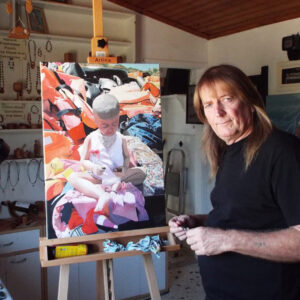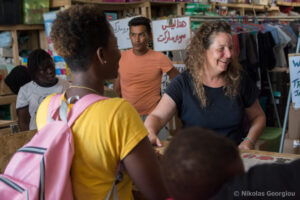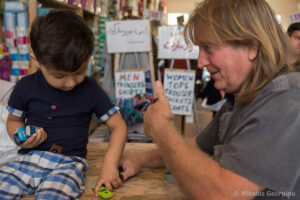Eric Kempson
Credentials
Humanitarian Cause
Emergency Response, Rescue in Emergency Situations, Search and Rescue Operation, Forced Displacement, Supporting Refugees
Impact Location
Greece
Occupation
Activist / Refugee Activist
Photo Gallery
About
Eric Kempson is an artist, humanitarian, and co-founder of the Hope Project, an organization that has offered critical support to refugees arriving on the Greek island of Lesvos since 2016. Known for his dedication to providing dignity, compassion, and basic rights to displaced individuals, Eric’s work bridges art and activism. Together with his wife, Philippa, he has transformed his home into a sanctuary for refugees and played a crucial role in establishing initiatives to empower these individuals through creative and rehabilitative programs. Eric’s work with refugees, alongside his reputation as a talented sculptor working primarily with olive wood, has made him a respected figure in both the artistic and humanitarian communities.
Born in Hampshire, England, in 1955, Eric grew up in Winchester, where he developed an early affinity for nature that would guide much of his life and work. In his early career, Eric worked closely with wildlife, including big cats and baboons, in safari parks across England and Italy. His experience with large-scale estate management and landscape design further deepened his connection to the natural world, which later informed his artistic pursuits. This combination of skills led Eric to Lesvos, Greece, in 2000, where he, his wife Philippa, and their young daughter settled in the picturesque town of Molyvos. Inspired by the natural beauty around him, Eric became a devoted artist, specializing in painting and carving sculptures from local olive wood. His art reflects his respect for the environment, and his innovative techniques have set his creations apart as both intricate and soulful.
Eric’s journey took an unexpected turn in 2014 when the Syrian civil war ignited a refugee crisis that brought thousands to the shores of Lesvos, only six miles from Turkey. As desperate individuals arrived by boat, often in perilous conditions, Eric and Philippa quickly shifted their focus from art to activism. Each day brought heart-wrenching scenes of people who had fled violence and danger, only to face further hardships as they sought safety on European soil. Kempsons opened their home and provided food, clothing, shelter, and compassion, filling the void left by insufficient governmental support. Their response to the refugee crisis highlighted a profound commitment to human dignity and inspired others on the island and beyond.
“This tragedy is happening right on our doorstep; how could we look away? One day, 700 people appeared all at once. We tried to give them something to eat and dry clothes to wear. These people had just spent three or four days hiding in the forests of Turkey without food or water. Many of them were hurt, and we didn’t have a doctor with us. Philippa did her best to fix up those with minor wounds, while we took the more serious cases to the hospital.”
In 2016, Eric and Philippa founded the Hope Project, a charity committed to offering immediate relief to refugees and creating longer-term solutions for their well-being. Initially, they provided essentials such as water, food, and clothing to new arrivals on the island. Over time, the project grew into a broader network of support, assisting refugees with daily necessities, including hygiene products, diapers, blankets, and warm clothing, distributed from their main warehouse near the southeast camps of Lesvos. Despite facing intense resistance from some locals and harassment from right-wing groups opposed to their work, the Kempsons remained unwavering in their mission, driven by a belief that everyone deserves respect and compassion.
“These people are fleeing war zones; they are suffering terribly. The attitudes of the governments and the media in both Britain and Europe are disgusting. These are good people who need our help.”
The Hope Project soon expanded its reach to foster emotional healing and empowerment for refugees. In addition to basic aid, Eric and Philippa introduced the “Hope Project Art” center, where refugees engage in painting, music, performing arts, and other creative programs. This art center offers participants a safe, supportive space to explore their talents, build community, and find solace amid challenging circumstances. Recognizing the particular hardships women face, they also developed dedicated safe spaces for female refugees, including a beauty salon, a female-only gym, and an arts and crafts center. Here, women can relax, connect with others, and regain a sense of normalcy.
Other initiatives under the Hope Project include a tailor shop and a barber service, offering both employment opportunities and valuable services to the refugee population. In these roles, refugees themselves often volunteer, contributing their skills to the community and finding purpose beyond their daily struggles. This sense of empowerment is at the heart of the Hope Project’s philosophy, as Eric and Philippa firmly believe that the best way to help refugees rebuild their lives is to enable them to take an active role in their own recovery and that of others.
One of the most harrowing experiences Eric and Philippa encountered took place on October 28, 2015, when a boat carrying refugees exploded near the coast. In the ensuing chaos, Eric’s daughter Elleni, who was also involved in helping refugees, risked her life to rescue children from the sinking boat.
“Our daughter Elleni swam to where the boat was sinking to dive for babies. She was on her way back to the beach with a baby under her arm when she was grabbed by a man who couldn’t swim. He dragged them all underwater. I immediately went to her rescue, but she was able to shake him off and save herself and the baby.”
The family’s unwavering courage and selflessness became emblematic of their work, earning them widespread recognition. Their actions attracted the attention of journalists and volunteers from around the world, leading to greater awareness of the refugee crisis and a network of international supporters. However, their dedication also made them targets of animosity, both locally and online. Despite these challenges, the Kempsons have continued their efforts, determined to provide refuge and hope to those who need it most.
Over the years, the Hope Project has adapted to changing needs and circumstances, continually seeking ways to enhance its impact. Eric’s advocacy extends beyond direct aid; he is vocal about the need for Europe to address the root causes of the refugee crisis and adopt more humane policies. In his view, the lack of safe, legal avenues for asylum seekers has fueled dangerous trafficking networks, leading to widespread suffering and exploitation. Eric and Philippa have called on European governments to reconsider their stance on refugees, emphasizing the profound human cost of treating these individuals as “illegal migrants” instead of recognizing their plight as people fleeing war and persecution.
“Government representatives should really come down here to see things with their own eyes. We are Europeans, we consider ourselves civilized, but we are all heading 60 years back into the past.”
Eric Kempson’s story is one of resilience, empathy, and dedication. Through the Hope Project, he has shown that even the smallest acts of kindness can profoundly impact individuals facing unimaginable hardship. The project has not only offered tangible aid but also served as a beacon of humanity in a world often marked by indifference. Eric’s art, once his primary focus, now serves a different purpose: to remind others of the natural beauty and interconnectedness of all life, a vision he carries into his humanitarian work. Today, the Hope Project remains an essential support network on Lesvos, a testament to Eric and Philippa’s enduring commitment to restoring dignity and hope to displaced people.
The information on this page was last updated on 11/05/2024 and was provided by the Luminary.



